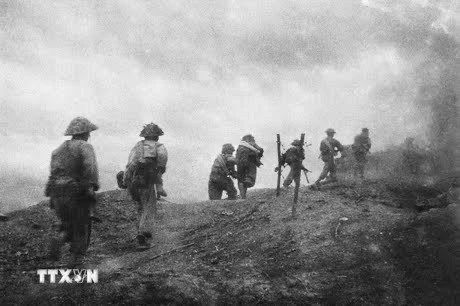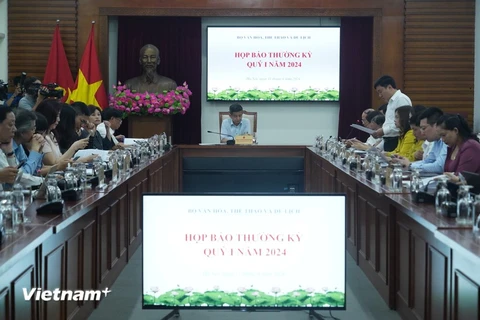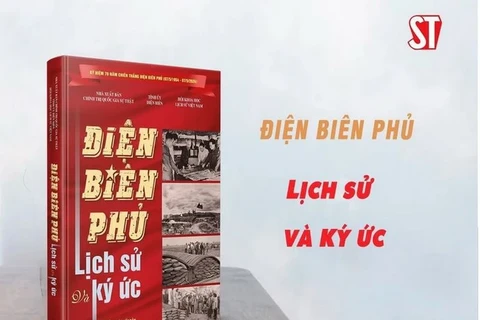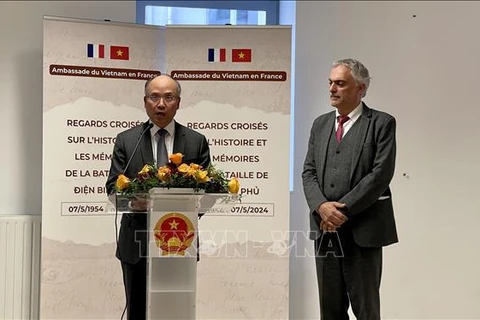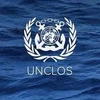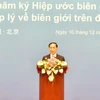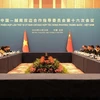London (VNA) - The enormous sacrifices that enabled the decisive victory at Dien Bien Phu in 1954 were the products of a unique political and military praxis, stemming directly from the personal qualities and intellectual brilliance of Ho and Giap, and collectively applied and developed through the party’s cadres, according to British historian John Callow.
This method created a durable path to freedom, that has the capacity to maintain and enhance Vietnam’s socialist revolution, he said.
In a recent interview granted to the Vietnam News Agency’s correspondent in the UK, Callow said lightening rarely strikes twice, but in the case of the relationship - and creative synthesis - between President Ho Chi Minh and General Vo Nguyen Giap, it certainly did. The political visionary was complimented by the military theorist. Together they forged the Communist Party of Vietnam (CPV), and a revolutionary army, that were capable of freeing the country and securing its independence, free of domination by external governmental and economic forces.
The British historian pointed out that war, as Ho Chi Minh and Vo Nguyen Giap, knew with every fibre of their souls, is a last resort. The savage reality that they faced was that French and North American imperialism were never going to concede anything without a fight. The tragic story of the risings of the Vietnamese people against feudalism and colonialism, across the 19th century, was testimony of that fact. This knowledge necessitated an entirely new concept of armed struggle, in the words of General Giap, the: “fundamental principle of the conduct of a revolutionary war” is to “strike to win, strike only when success is certain; if it is not, then don’t strike” at all.
Within this context, Dien Bien Phu’s significance lay in its transformation of what had started out as a network of irregular guerrilla bands into a conventional army capable of defeating seasoned, and extremely well-armed and well-trained Western forces in a set-piece battle; and in so doing confirming - through the deliberations of the Geneva Conference - the passage of colonial “Indochina” to the nation state of Vietnam.
Callow said the victory at Dien Bien Phu and the eventual reunification of the country were not mere accidents of history but the result of careful planning, firm adherence to principle, and the creative application of Marxist theory to the specific conditions of Vietnamese society. Marxism - which had hitherto been primarily rooted in a Western, industrial context - was greatly enriched by Ho Chi Minh, who applied its vital essence and critique of imperialism to the task of liberating the Vietnamese people and the transformation of a peasant economy, ridden by landlordism and colonial exploitation, into a modern state, where the status of small and middle farmers was enhanced, and where the fruits of productive labour might be shared for the benefit of all, guaranteeing the rights to home, health, work and welfare.
As a consequence, the party was able to become the extension of the consciousness of the people, responding to their needs and aspirations, while providing the central leadership – and sheer political will – capable of challenging the vast edifice of imperialism that had been ranged against them. It bore not only the imprint of Ho and Giap, but of the entire Vietnamese people. In this way, it was capable of assuming a vanguard role in the wars of liberation and of forging a peace based upon true national independence and the progressive socialisation of the economy and the state.
Discussing the significance of the victory at Dien Bien Phu to the then national liberation movements in the world, Callow said the victory changed everything, shattering the myth of western, colonial, dominance (whether military, cultural, or economic) and opened-up the vision of national liberation for the global majority peoples. It provided the direct inspiration for those struggling against French colonial power in North Africa, sparking the resistance movement in Algeria, and providing an inter-dependent political and military strategy that would inform the Cuban Revolution, and the struggles of Frelimo in Mozambique and the MK (or ‘Spear of the Nation’) in Apartheid era South Africa.
On the one hand, it demonstrated to the rulers of the old Colonial powers- such as Great Britain, France, Portugal, and Belgium - that the military balance had shifted away from them, and that they could neither hold, nor reclaim, the empires and forms of domination, and exploitation, that they had exercised prior to the Second World War. On the other, it inspired generations of freedom fighters, such as Ben Bella, Samora Machel, Che Guevara, Angela Davis, Thomas Sankara and Chris Hani, to take action.
In short, it enabled the redrawing of the world map, and the redistribution of economic and political power across the globe on a more equitable basis.
Speaking about the growth of the People’s Army of Vietnam since its foundation in 1944, the British scholar said the genesis of the Viet Minh as a “People’s Army”, expressing the struggle and the hopes of the entire nation, laid the foundations of its later successes. The men and women who comprised its ranks were not distinct from the people, but a vital part of them. They fought for ideals, for freedoms, for the realisation of national unity, and for a vibrant socialist future that brought dignity, equality, and justice to all.
He pointed out that is precisely what the French commanders, General Navarre and Colonel de Castries, failed to understand. They could not conceive of the concerted effort of an entire people to create the supply lines and transport the munitions and heavy artillery, in near total secrecy, to enable the encirclement of the French army at Dien Bien Phu. They could not imagine the combination of strength and humanity that had fashioned the Vietnam People’s Army.
He attributed this to Vietnam’s victories against French colonialists and American imperialists.
Assessing Vietnam’s recent achievements, Callow said there is no denying that Vietnam has faced some incredibly tough problems and threats over recent years, the country remains as a beacon to those developing nations, just as it was in the wake of the victory at Dien Bien Phu. It does so on account of its conception of nationhood, its independence, and its principled respect for international law and treaties. It does so because of its continued efforts to realise the vision of President Ho Chi Minh and General Giap, as evidenced in the decisions of the recent 13th Party Congress, to combat corruption and inequality, to maintain economic growth that runs contrary to global trends, and to re-invigorate the cultural and political gains achieved through the life’s work of all those who participated in the liberation struggle.
John Callow is a historian, author and trade unionist. He has written widely on Early Modern witchcraft, politics and popular culture. His books include Witchcraft & Magic in Sixteenth- and Seventeenth-Century Europe (co-authored with Professor Geoffrey Scarre); James II: King in Exile; Embracing the Darkness: A Cultural History of Witchcraft, and The Last Witches of England: A Tragedy of Sorcery and Superstition./.

